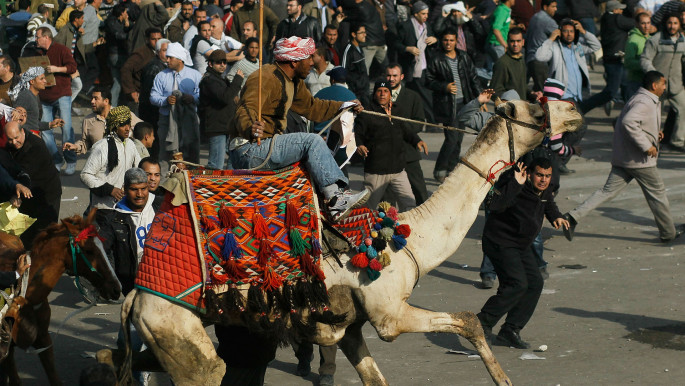#25Jan: How Egypt toppled a dictator
The years that followed saw unrest, a military coup, and a brutal crackdown by Abdel Fattah al-Sisi.
On 25 January 2011 the hopes and expectations of millions of Egyptians was that there would be an end to hardship and authoritarianism, and that the country would join Tunisia in becoming a new model Arab democracy.
Although the set-backs since the 2013 military coup have seen Egyptians live under a stifling police state, it has not extinguished the memory of the country's historic revolution.
Here is how Egypt captured the world's attention and toppled a tyrant.
14 January - Protests in Tunisia see dictator Zine El Abedine Ben Ali flee the country, with the North African country enter into a new era of democracy and igniting the Arab Spring.
 |
| Revolution was in the air [Getty] |
25 January - Following protests and acts of self-immolation in Egypt, activists call for a "Day of Rage" against police brutality. Thousands gather in Cairo and march on the ruling National Democratic Party headquarters.
Anti-government demonstrations break out in other parts of Egypt, with three protesters killed by police during the rallies in the capital. This is the day the Egyptian revolution begins and Tahrir Square becomes the focal point of the rebellion.
27 January - Government tries to disrupt activists' attempts to organise more protests via Facebook and Twitter by interrupting the internet. More protesters killed by security forces.
28 January - Large-scale anti-government protests break out in Cairo and elsewhere, which activists dubbing the day "Friday of Anger". The capital is put under a security clampdown, while 11 are killed in the Suez region.
29 January - President Hosni Mubarak - in power since 1981 - attempts to placate the protesters by announcing, shortly after midnight, that he has sacked his cabinet.
He appoints regime ally Omar Suleiman as his vice-president, the first appointment to this position in three decades.
Large-scale unrest breaks out across Egypt but ruptures of rebellion are seen in the army when soldiers refuse orders to open fire on protesters.
Embassies warn against visiting Egypt, or pull their citizens out of the country.
31 January - Opposition groups call for a strike and million man march to topple the government.
1 February - Mubarak offers more concessions and says he won't run for election again, but protests continue with clashes between pro and anti-regime demonstrations.
 |
| Regime supporters tried to break up protests [Getty] |
2 February - The infamous "Battle of the Camels" takes place, when pro-regime mobs head to Tahrir Square on camels and horses. They attempt to disperse the anti-government crowds with whips, knives and sticks.
Around 1,500 are injured and three killed, further igniting the anger of Egyptians against the government.
3 February - Gunfire from security forces aimed at the demonstrations in Tahrir Square kills five protesters and injure others.
6 February - Interfaith prayer services are held between Christians and Muslims in Tahrir Square.
7 February - Funeral is held for journalist Ahmed Mahmoud, who was shot dead while covering the protests. Google executive and activist Wael Ghonim is released from detention.
9 February - Labour unions organise strikes in support of the protesters, crippling the country.
10 February - Mubarak sparks fury again when he makes a highly-anticipated televised speech and again refuses to step-down immediately, intensifying protests and leading to more unrest in the military.
11 February - Vice-President Omar Suleiman announces that Mubarak has stepped down and that power would be handed over to the military.
Celebrations erupt across Egypt, but it is not the end of authoritarianism in the country...





 Follow the Middle East's top stories in English at The New Arab on Google News
Follow the Middle East's top stories in English at The New Arab on Google News


